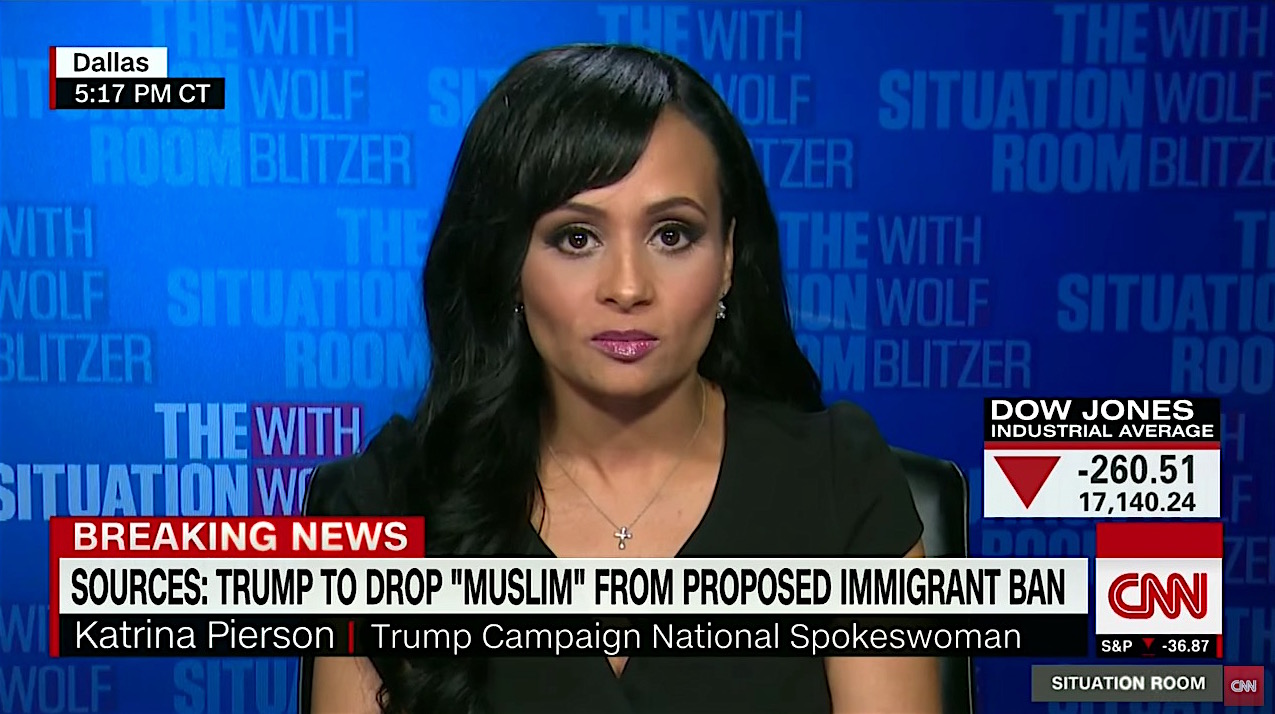Donald Trump's spokeswoman struggles to explain the state of proposed Muslim ban


A free daily email with the biggest news stories of the day – and the best features from TheWeek.com
You are now subscribed
Your newsletter sign-up was successful
Over the last two weeks, Donald Trump has made a rhetorical shift in his proposal to temporarily ban all Muslims from entering the U.S., a policy he unveiled in December after the San Bernardino shooting. After the Orlando nightclub shooting, Trump gave a scripted speech in which he said he "will suspend immigration from areas of the world where there is a proven history of terrorism against the United States, Europe, or our allies." In Scotland over the weekend, Trump said he "would limit specific terrorist countries, and we know who those terrorist countries are," then added later that when "you have a country that's loaded up with terrorism, we don't want the people coming in until they're very strongly vetted."
So is Trump's policy now that people of any religion from unspecified "terror states" will be banned, or only those who can't be "strongly vetted," or is it still all Muslims, with some exceptions? Trump is preparing a policy memo to clarify the state of his Muslim ban, but spokeswoman Hope Hicks told The Associated Press on Monday that Trump "has been very clear," and it's the media that has "tried to cause confusion."
Another spokeswoman, Katrina Pierson, tried to clarify Trump's policy on Monday to CNN's Brianna Keilar. "There has been no change," she said. Trump "still does not want to allow individuals to come into this country who cannot be vetted." "Individuals or Muslims?" Keilar asked. "Well, it doesn't really matter where you're coming from," Pierson said, reiterating that Trump had added "terrorist nations" to his policy. Keilar pointed out that Paris and Belgium have suffered attacks by Belgian and French citizens. "That's the point," Pierson said.
The Week
Escape your echo chamber. Get the facts behind the news, plus analysis from multiple perspectives.

Sign up for The Week's Free Newsletters
From our morning news briefing to a weekly Good News Newsletter, get the best of The Week delivered directly to your inbox.
From our morning news briefing to a weekly Good News Newsletter, get the best of The Week delivered directly to your inbox.
You can also watch below to see Keilar explain the long vetting process for refugees being settled in the U.S., and Pierson having none of it. Peter Weber
A free daily email with the biggest news stories of the day – and the best features from TheWeek.com
Peter has worked as a news and culture writer and editor at The Week since the site's launch in 2008. He covers politics, world affairs, religion and cultural currents. His journalism career began as a copy editor at a financial newswire and has included editorial positions at The New York Times Magazine, Facts on File, and Oregon State University.
-
 6 exquisite homes with vast acreage
6 exquisite homes with vast acreageFeature Featuring an off-the-grid contemporary home in New Mexico and lakefront farmhouse in Massachusetts
-
 Film reviews: ‘Wuthering Heights,’ ‘Good Luck, Have Fun, Don’t Die,’ and ‘Sirat’
Film reviews: ‘Wuthering Heights,’ ‘Good Luck, Have Fun, Don’t Die,’ and ‘Sirat’Feature An inconvenient love torments a would-be couple, a gonzo time traveler seeks to save humanity from AI, and a father’s desperate search goes deeply sideways
-
 Political cartoons for February 16
Political cartoons for February 16Cartoons Monday’s political cartoons include President's Day, a valentine from the Epstein files, and more
-
 Judge blocks Hegseth from punishing Kelly over video
Judge blocks Hegseth from punishing Kelly over videoSpeed Read Defense Secretary Pete Hegseth pushed for the senator to be demoted over a video in which he reminds military officials they should refuse illegal orders
-
 Trump’s EPA kills legal basis for federal climate policy
Trump’s EPA kills legal basis for federal climate policySpeed Read The government’s authority to regulate several planet-warming pollutants has been repealed
-
 House votes to end Trump’s Canada tariffs
House votes to end Trump’s Canada tariffsSpeed Read Six Republicans joined with Democrats to repeal the president’s tariffs
-
 Bondi, Democrats clash over Epstein in hearing
Bondi, Democrats clash over Epstein in hearingSpeed Read Attorney General Pam Bondi ignored survivors of convicted sex offender Jeffrey Epstein and demanded that Democrats apologize to Trump
-
 El Paso airspace closure tied to FAA-Pentagon standoff
El Paso airspace closure tied to FAA-Pentagon standoffSpeed Read The closure in the Texas border city stemmed from disagreements between the Federal Aviation Administration and Pentagon officials over drone-related tests
-
 Judge blocks Trump suit for Michigan voter rolls
Judge blocks Trump suit for Michigan voter rollsSpeed Read A Trump-appointed federal judge rejected the administration’s demand for voters’ personal data
-
 US to send 200 troops to Nigeria to train army
US to send 200 troops to Nigeria to train armySpeed Read Trump has accused the West African government of failing to protect Christians from terrorist attacks
-
 Grand jury rejects charging 6 Democrats for ‘orders’ video
Grand jury rejects charging 6 Democrats for ‘orders’ videoSpeed Read The jury refused to indict Democratic lawmakers for a video in which they urged military members to resist illegal orders
